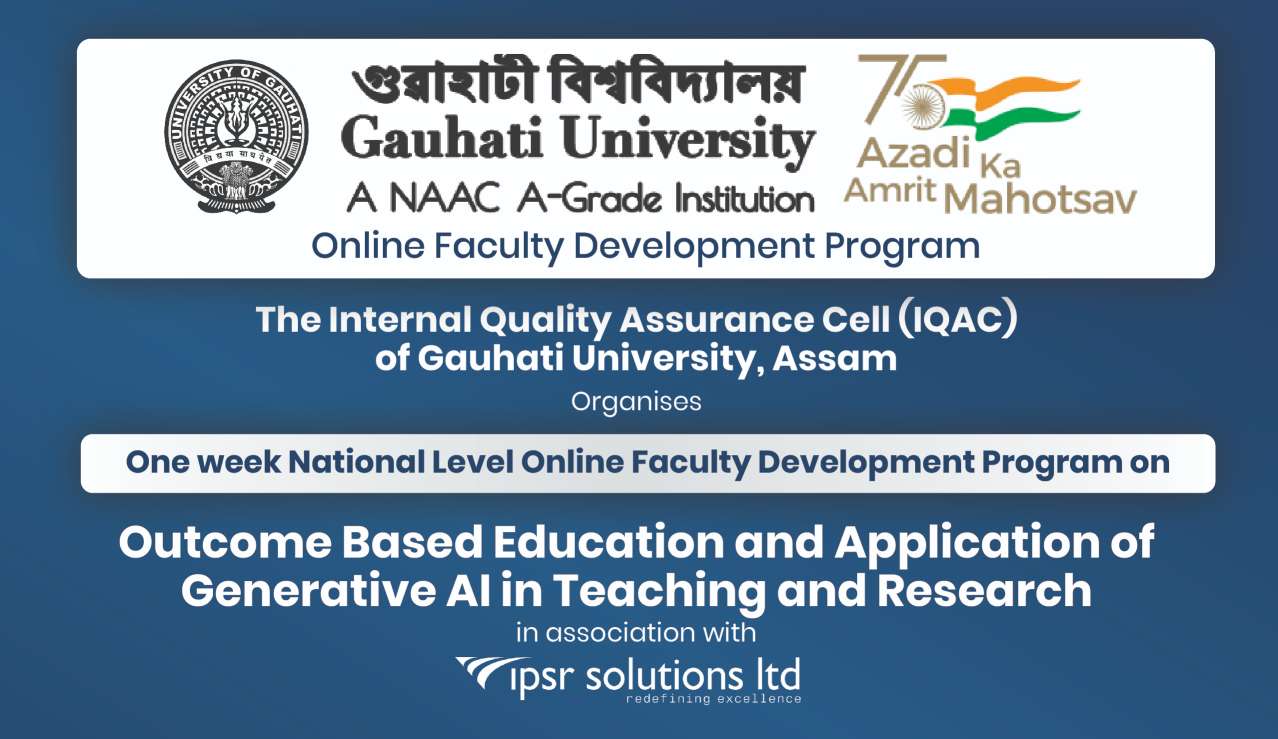
Outcome Based Education (OBE) has emerged as a transformative approach in higher education, emphasizing the achievement of specific competencies and skills by students upon the completion of their courses. Unlike traditional education systems that focus on content delivery and rote learning, OBE ensures that students not only grasp theoretical concepts but also demonstrate their ability to apply knowledge in practical settings. This shift aligns educational objectives with the demands of the modern workforce, fostering a generation of well-prepared graduates to meet real-world challenges.
One of the primary benefits of OBE is its student-centred nature, which tailors the learning experience to meet individual needs and aspirations. By clearly defining learning outcomes, educators can design curricula that provide students with the necessary tools and experiences to achieve these goals. This approach not only enhances student engagement but also promotes a deeper understanding of the subject matter, as students can see the relevance and application of their studies in their future careers.
In parallel with the adoption of OBE, the application of Generative AI in teaching and research is revolutionising the landscape of higher education. Generative AI, which involves algorithms capable of creating new content based on existing data, offers innovative solutions for personalized learning, content creation, and academic research. By harnessing the power of AI, educators can develop adaptive learning platforms that cater to the unique needs of each student, providing real-time feedback and customized learning paths.
Generative AI also plays a crucial role in enhancing the research capabilities of academic institutions. Researchers can leverage AI tools to analyze vast datasets, identify patterns, and generate new hypotheses, significantly accelerating the research process. This not only facilitates groundbreaking discoveries but also democratizes access to research resources, allowing institutions with limited funding to participate in cutting-edge research activities.
The integration of Generative AI into OBE frameworks can further enhance educational outcomes by providing students with immersive and interactive learning experiences. AI-powered simulations and virtual labs allow students to experiment with complex concepts in a risk-free environment, fostering experiential learning and critical thinking skills. Additionally, AI-driven assessment tools can provide objective evaluations of student performance, ensuring that learning outcomes are met consistently across diverse student populations.
Moreover, the application of Generative AI in education supports the continuous improvement of teaching methodologies. Educators can utilize AI analysis to gain insights into student learning behaviours, identify areas of improvement, and adapt their teaching strategies accordingly. This data-driven approach ensures that educational practices remain relevant and effective in an ever-evolving academic landscape.
In short, the convergence of Outcome Based Education and Generative AI presents a powerful paradigm for the future of higher education. By focusing on specific learning outcomes and leveraging advanced AI technologies, educational institutions can enhance student learning experiences, improve research capabilities, and ensure that graduates are equipped with the skills and knowledge necessary to succeed in a rapidly changing world. This integrated approach not only addresses the current demands of the educational sector but also sets the foundation for a more dynamic and responsive education system in the years to come.
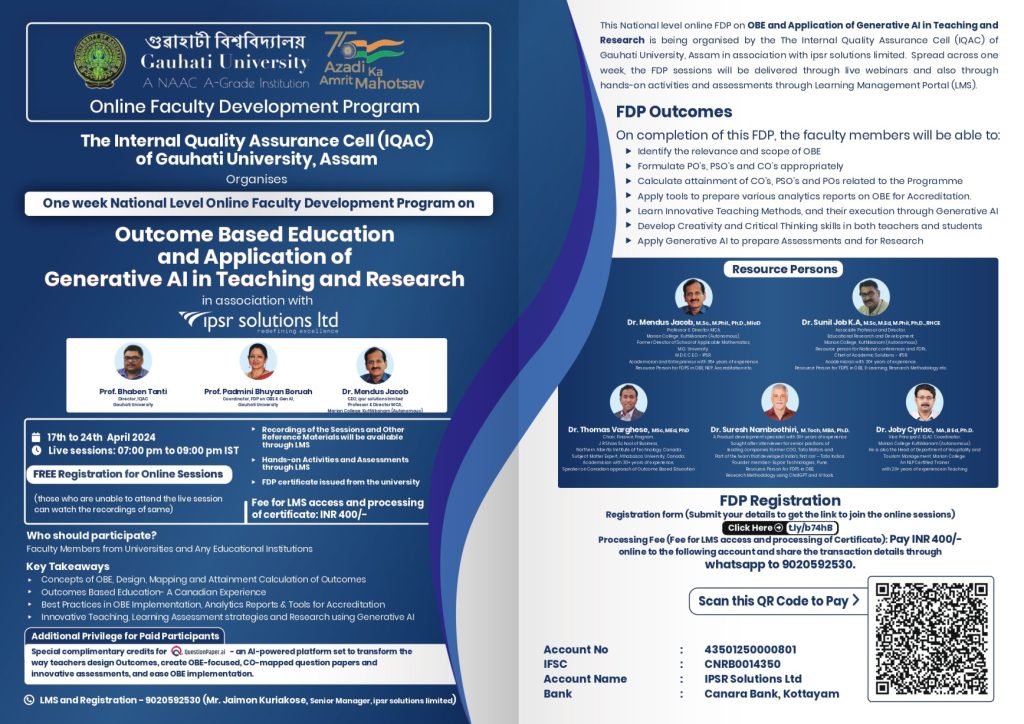
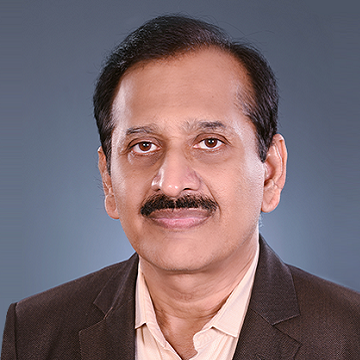
Dr. Mendus Jacob
Professor & Director, MCA, Marian College Kuttikkanam (Autonomous) and MD & CEO of ipsr solutions limited.
A former Director of the School of Applicable Mathematics, MG University, Dr Mendus Jacob is an Academician and Entrepreneur with 35+ years of experience and a well-known resource person for FDPs in OBE, NEP and Accreditation.

Dr. Sunil Job KA
Associate Professor and Academic Mentor, Marian College, Kuttikkanam (Autonomous and Chief of Academics, ipsr solutions limited.
A resource person for several FDPs in OBE, Data Science, E-Learning etc., Dr Sunil has served as a Visiting Team Member of NCTE for ‘Grant of Recognition’ and as a resource person for the Affiliation Renewal Committee of MG University.
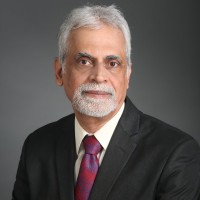
Dr. Suresh Namboothri
The Founder Member of Espoir Technologies Pune
A former Chief Operating Officer with Tata Motors, he was part of the team that developed the first Indian car – Indica. A well-known resource person for FDPs on OBE, Critical and Creative Thinking, Dr Suresh Namboothiri, a designer and developer of 200+ products with over 30 years of industry experience, is also the founder of Espoir Technologies, Pune. He is a Mentor, Researcher, and Educator in addition to a senior Corporate Consultant.
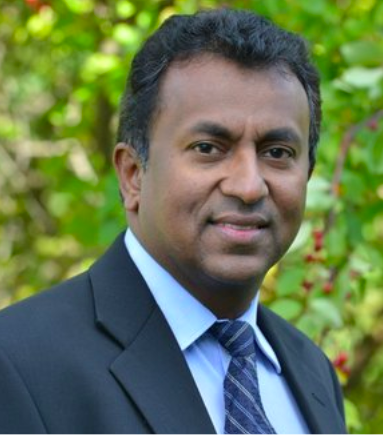
Dr. Thomas Varghese
Chair, Finance Program, J R Shaw School of Business, Northern Alberta Institute of Technology, Canada.
Serves as Subject Matter Expert at Athabasca University in Canada. He has authored numerous papers in Statstics and Education and has presented at various National and International Conferences. In addition to his academic pursuits, Dr Thomas is passionate about community service, volunteering in his community and church.
Dr Thomas has won multiple awards in Lionism and is a Certified Lions Instructor, showcasing his dedication and expertise within the organisation.

Dr. Joby Cyriac
Vice Principal and IQAC Coordinator at Marian College Autonomous Kuttikkanam
He is also the Head of the Department of Hospitality and Tourism Management at Marian College. An experienced faculty with over twenty years of teaching experience, Dr Joby Cyriac is also an NLP Certified trainer.
Participants in the Faculty Development Programme include Deans, Heads of Departments, and Faculty Members from Higher Educational Institutions across the Indian States and abroad.
2626 participants benefited from the seven-day Faculty Development Programme on Digital Pedagogy: ICT and AI-Assisted Teaching in line with OBE and NEP organised by the Internal Quality Assurance Cell of Gauhati University, Assam in association with ipsr solutions limited.
Screenshots of a few participants
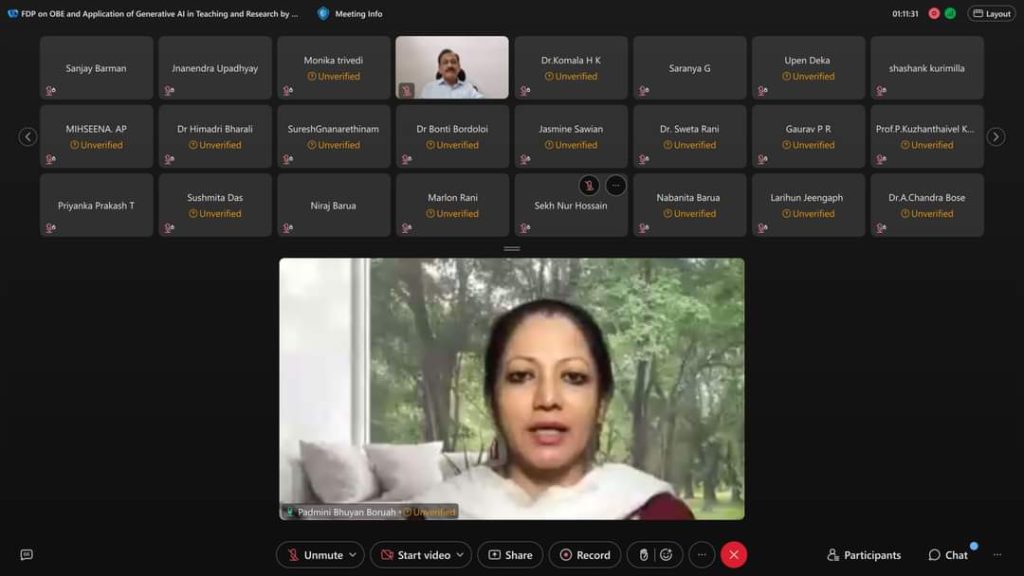
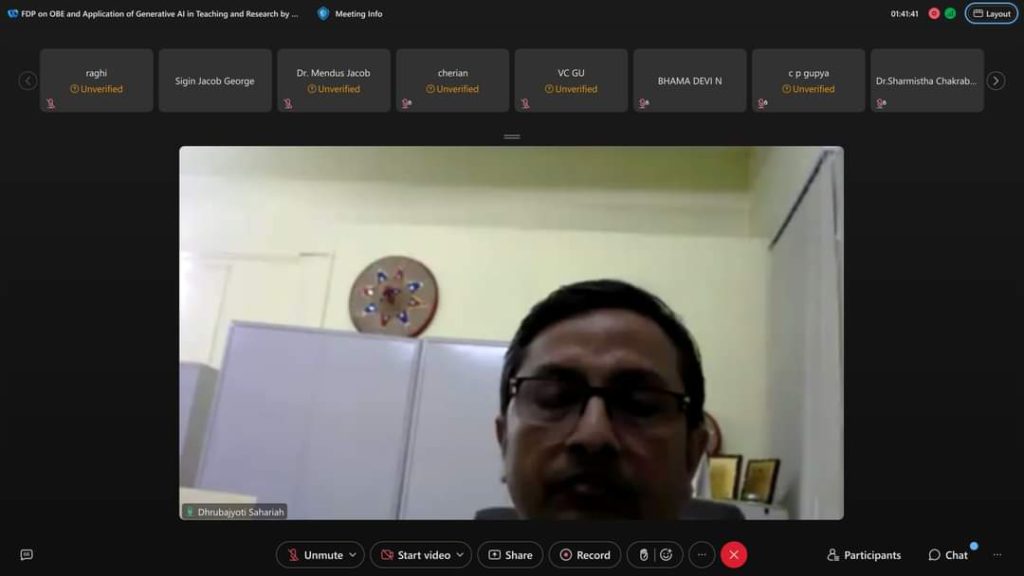
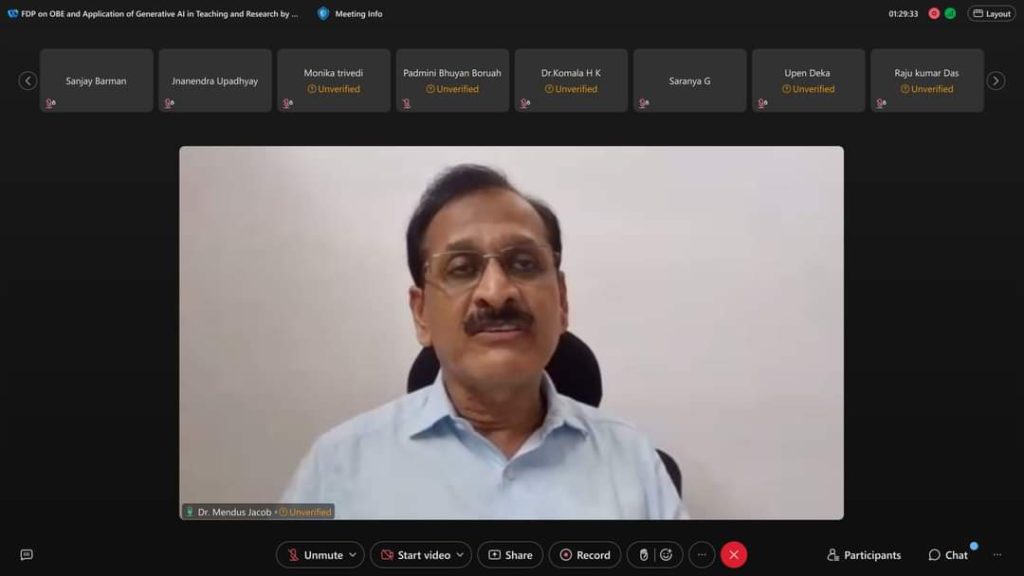
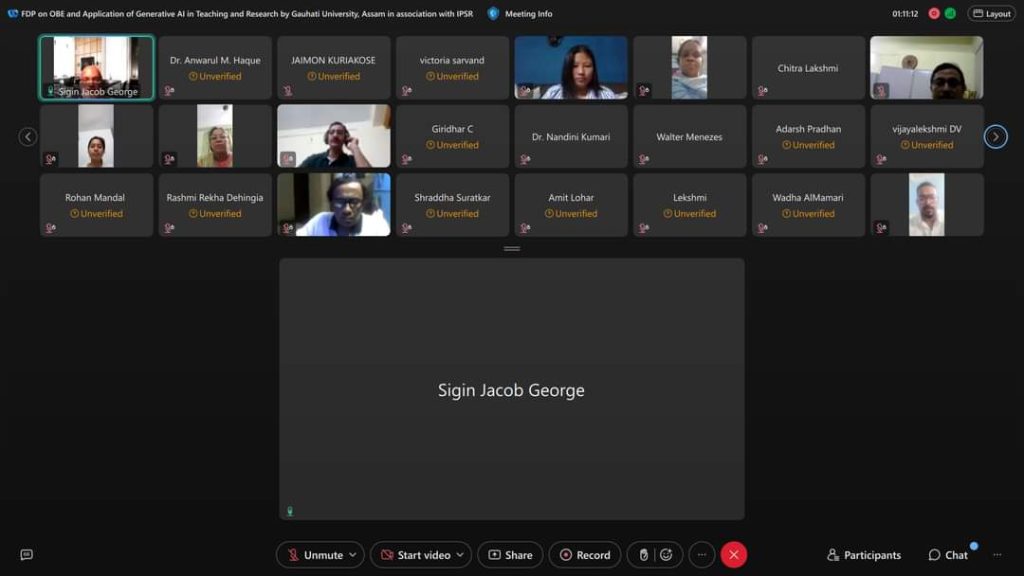
The one-week National Level Online Faculty Development Programme on Outcome Based Education and Application of Generative AI in Teaching and Research started at 19.00 Hrs on the 17th of April 2024.
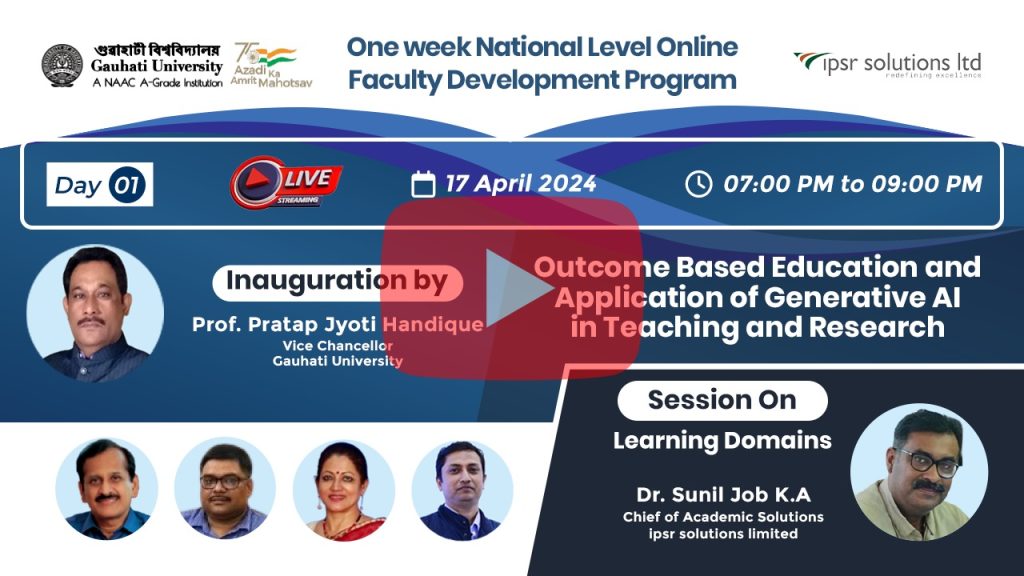
Inaugural Function
The inaugural function of the week-long Faculty Development Programme on Outcome Based Education and Application of Generative AI in Teaching and Research began at 19.00 Hrs on the 17 of April 2024.
The Welcome Speech was by Prof Padmini Bhuyan Boruah, the Coordinator of the Faculty Development Programmes at Gauhati University. She briefed about Gauhati University and its plans/roles in setting up an enhanced quality education system. During her speech, Prof Padmini mentioned that collaborating with ipsr will help implement Outcome Based Education at Gauhati University properly. Prof Padmini took time to welcome the dignitaries, the resource persons, and the participants who had turned out in huge numbers to attend the Faculty Development Programme.
The Inaugural Address was delivered by Prof Pratap Jyoti Handique, Honourable Vice Chancellor, Gauhati University. Prof Handique started his speech by welcoming all the dignitaries and participants to the event and stated that Outcome Based Education has become the most important system in the present educational system and that it focuses on the student’s performance and results where students are given clear objectives and regular evaluation of progress where they receive personalised feedback on how well they have achieved those roles. In his speech, Prof Handique mentioned that educators must be focused on what their learners must understand and be able to do. He also said that the curriculum design must contain an appropriate definition of the intended learning outcomes that learners achieve at the end of the programme. He further stated that educators are expected to establish challenging standards in high performance to encourage learners to engage deeply in what they are learning. Finally, he mentioned that expanded opportunities allow all learners to learn the same concept in a similar style and duration. Through these processes, learners can achieve very high standards of performance. Pfof Handique further briefed about Generative Intelligence, its role in day-to-day life and how it can change the future educational system.
Dr Mendus Jacob, MD and CEO of ipsr solutions limited and a well-known resource person in Outcome Based Education gave the Introduction to the FDP. In his speech, Dr Mendus expressed his hope that the diverse backgrounds of the participants would promise rich interactions and insights that would prove invaluable in refining approaches to innovative teaching, learning and assessment activities particularly in light of the challenges posed by the lack of expertise among faculty members in the practical implementation of OBE. Dr Mendus further mentioned that in line with the commitment to innovation, the Learning Management System, which integrates various features including workshops for learning and assessments, learning activities for assured learning, forums for collaborative engagement, and additional tools like Mentimeter and Padlet exemplifies the effective use of online platforms for higher education.
Prof Dhrubajyoti Sahariah delivered the Word of Thanks in which he sincerely thanked all the distinguished members of Gauhati University, resource persons, members of ipsr, and all the participants. He took his time to thank Prof Pratap Jyoti Handique, honourable Vice Chancellor of Gauhati University for the enlightening speech delivered during the inaugural address. He thanked Dr Mendus Jacob, MD and CEO of ipsr solutions for providing a valuable introduction to the FDP enabling the participants to get invaluable insights into what is in store for the coming days and took his time to thank Prof Padmini Bhuyan Boruah for coordinating the FDP Programme. He further thanked all the participants from various institutions across India for their interest and active participation in the event.
Click to watch the Inaugural Ceremony of the week-long Faculty Development Programme on Outcome Based Education and Application of Generative AI in Teaching and Research organised by the Internal Quality Assurance Cell ( IQAC) of Gauhati University in collaboration with ipsr solutions limited.
Technical Session: Day 1 – Learning Domains
The inaugural day technical session was handled by Dr Sunil Job on the topic of Learning Domains concerning Bloom’s Taxonomy. Dr Sunil started the session by thanking Gauhati University for providing an opportunity to conduct the session and stated that the inaugural address by the honourable Vice Chancellor has set many valuable insights regarding Outcome Based Education, its importance and significance in contemporary situations where a paradigm shift is happening in teaching-learning methodology, and the total revamping of the curriculum in an undergraduate programme.
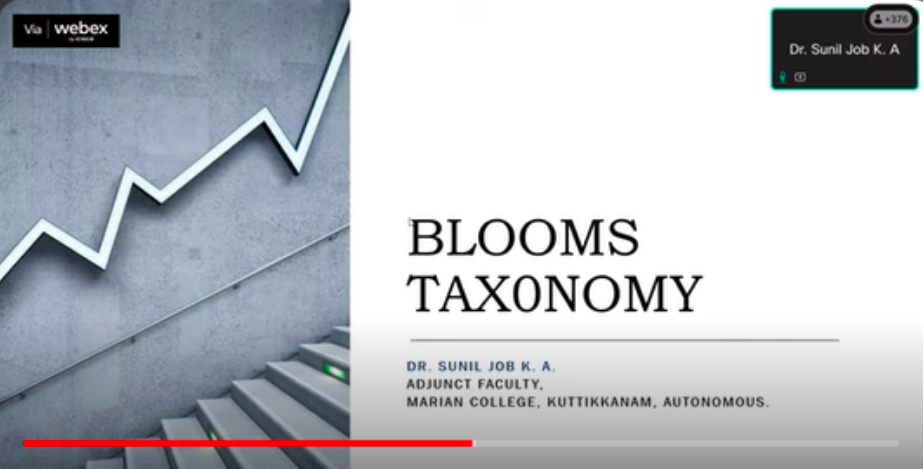
During the interesting and informative session, Dr Sunil explained Bloom’s Taxonomy, a significant factor and guidance in formulating Outcome Based Education. He started the session with Bloom’s Taxonomy as it evolved from the 1956 original level to the revised version by Mr Anderson, an associate of Benjamin Bloom in 2001, the transformation occurred from a taxonomical perspective, and how it is relevant in the present context.
During the session, Dr Sunil explained in detail the three hierarchical models – Cognitive Domain, Affective Domain, and Psychomotor Domain – used to classify educational learning objectives into levels of complexity and specificity. He also explained the six taxonomy levels, Remembering, Understanding, Applying, Analyzing, Evaluating, and Creating. Dr Sunil explained in detail the Revised Version of Bloom’s Taxonomy. He also took time to clarify the doubts/queries of the participants.
After the informative session on Bloom’s Taxonomy by Dr Sunil Job, the task “Question Paper Analysis based on Bloom’s Taxonomy” was assigned to the participants to analyze their depth of understanding of the topic.
Click to watch the inaugural day session Learning Domains – Bloom’s Taxonomy by Dr Sunil Job.
Dr Sunil started the resource person for the second day’s session and mentioned that the day two session would provide better clarity on the architecture of Outcome Based Education.
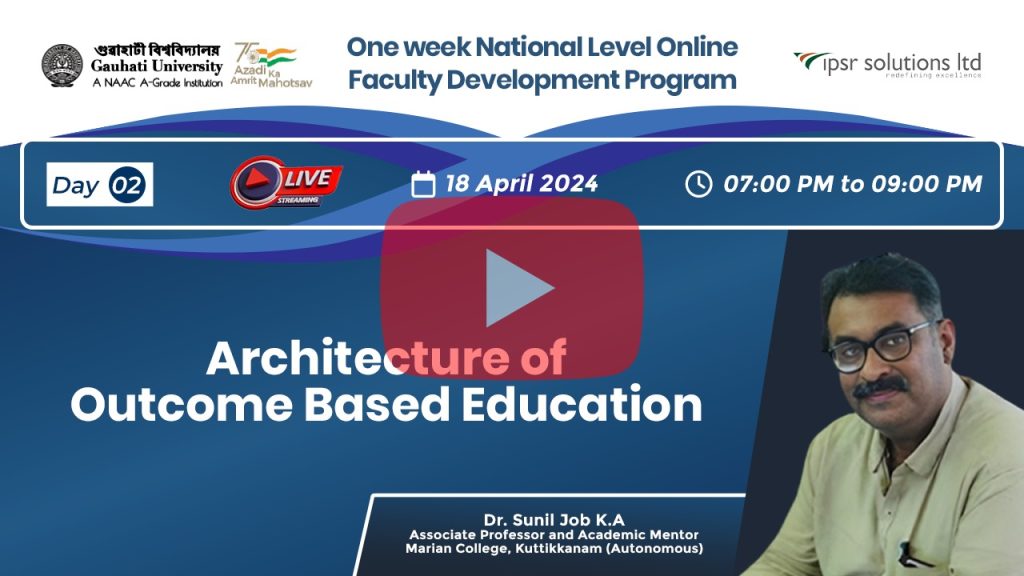
Dr Sunil during the session Dr Sunil mentioned that Outcome Based Education (OBE) was mainly confined to websites and portals in the form of POs and PSOs for a long period but, due to the New Education Policy 2020, it’s implemented in the educational system. According to Dr Sunil, major changes are expected in the methodologies, strategies, and the process of marching through the educational processes along the lines of the New Educational Policy. In his session, Dr Sunil explained the Program Educational Objectives, Graduate Objectives, Program Outcomes, Program Specific Outcomes, Course Outcomes, and Writing-Learning Outcomes. He mentioned that Outcome Based Education is based on the four principles mainly Clarity of Focus, Designing Down, High Expectations, and Expanded Opportunities. Dr Sunil also explained the importance of quality checks’ requirements for attaining a good outcome.
The participants were assigned a Workshop Activity “Course Outcome and Quality Check” on the second day of the Faculty Development Programme.
Click to watch the second-day session Architecture of Outcome Based Education by Dr Sunil Job.
Dr. Mendus Jacob was the resource person on the third day of the Faculty Development Programme with the topic Mapping of Outcomes, Calculation of Attainment & Analytical Reports.
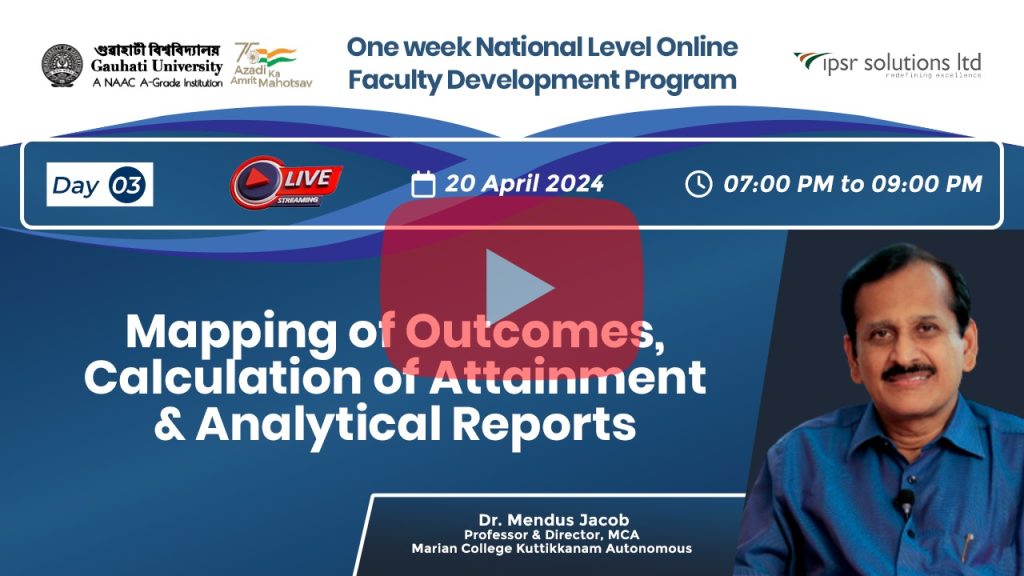
Dr Mendus briefed the participants about the OBE process and the various levels of mapping before entering into the main topic Mapping of Outcomes, Calculator of Attainment and Analytical Reports. He explained how PEOs, POs, PSOs and COs can be mapped. He stressed that this process is to be done before the attainment calculation. He mentioned that there are two levels of Mapping, the first being the CO-PO mapping or the CO-PSO Mapping, whereas the second is the activity or assessment level mapping with COs. Dr Mebdus further stated that Pos and PSOs are estimated from the component of COs related to the respective PO and PSO, and COs are estimated from the component-learning outcome of the activity related to the course.
Dr Mendus explained to the participants how the assessment is done in OBE. He mentioned that the final assessment done by estimating Program Outcomes and Program Specific Outcomes serves as a profile of the student’s competencies. He stated that while POs and PSOs are estimated from the component of COs related to the respective PO and PSO, COs are estimated from the component – Learning Outcome of the activity related to the course. He further mentioned that the first step is determining the mapping of the related components and the strength of mapping between lower and higher-order outcomes.
Dr Mendus explained the major difference between the traditional system of teaching and the Outcome Based Educational method where, the Traditional System is more Teacher-Centric and importance given to Teaching and Content, Knowledge-Driven and Rote Learning, while the OBE System is more Student-Centric giving more importance to Learning and Process thereby ensuring Knowledge and Performance.
Dr Mendus conducted a Mentimeter survey regarding “Strong Pillars of a Teacher” where the participants could give feedback on the essential qualities a teacher must possess.
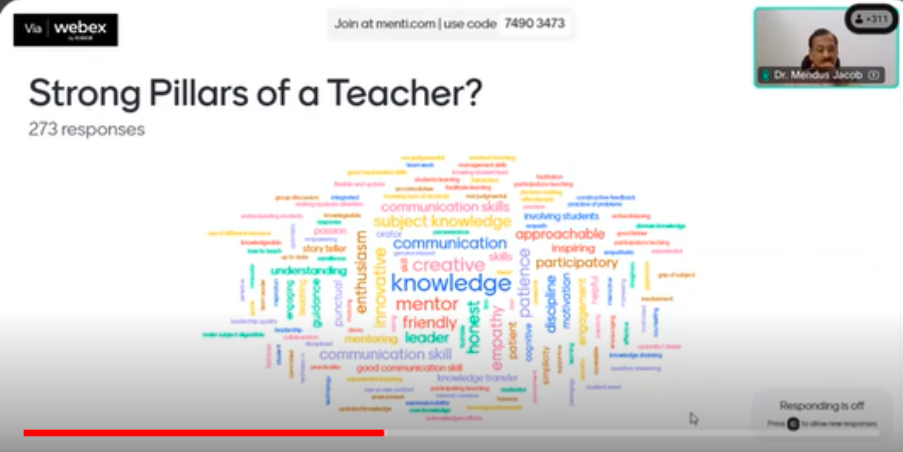
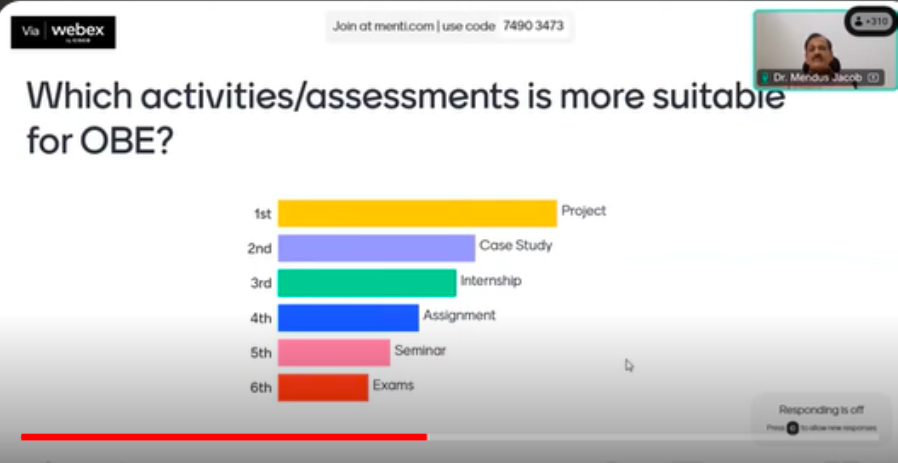
Two tasks, Formulation of Assessment Questions concerning a Course Outcome and finding the Mapping Strength and, CO Computation Prototype Model were assigned to the participants after the session
Click to watch the day five session Mapping of Outcomes, Calculation of Attainment & Analytical Reports, by Dr. Mendus Jacob.
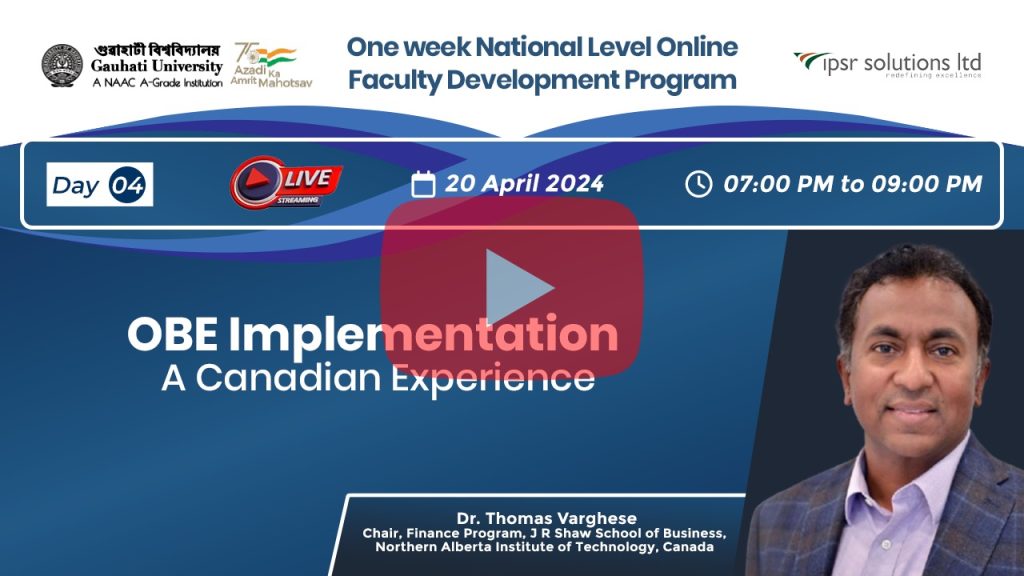
Dr Thomas Varghese, Chair, Finance Program, J R Shaw School of Business, Northern Alberta Institute of Technology, Canada handled the fourth-day session. Dr Thomas started the session by expressing his sincere gratitude for providing an opportunity to be a part of this event.
During his session, Dr Thomas briefly introduced OBE, its challenges, opportunities, and finally Questions and Answers. He went on to say that Outcome Based Education is not a novel idea and also mentioned the historical landmarks in OBE. Dr Thomas said, “Outcome Based Education means, organising results based on what we do instructional on the outcomes that we want to achieve – whether in specific parts of the curriculum or the schooling process as a whole”. He further mentioned that programs and instructions clearly define outcomes, while exit outcomes drive curriculum and instruction. He also discussed the difference between traditional education and Outcome Based Education.
According to Dr Thomas, in Canada, the usage of OBE ensures that the curriculum is relevant to the needs of the industry. He also discussed what is taught and how it is taught during Polytechnic education. He stressed that the right business career needs to be found for every institution ie. the programs must be designed to equip the students with the skills, knowledge, and hands-on experience essential for success in today’s rapidly evolving business landscape. He also stressed the importance of creating industry connections with students which are possible through Guest Speakers, Mock Interviews, Finance Speaker Series, Alumni Services, Institutional Research etc. and the need for Graduate Placement Surveys to maintain industry relationships.
Click to watch the day-four session Outcome Based Education – a Canadian Experience by Dr Thomas Varghese.
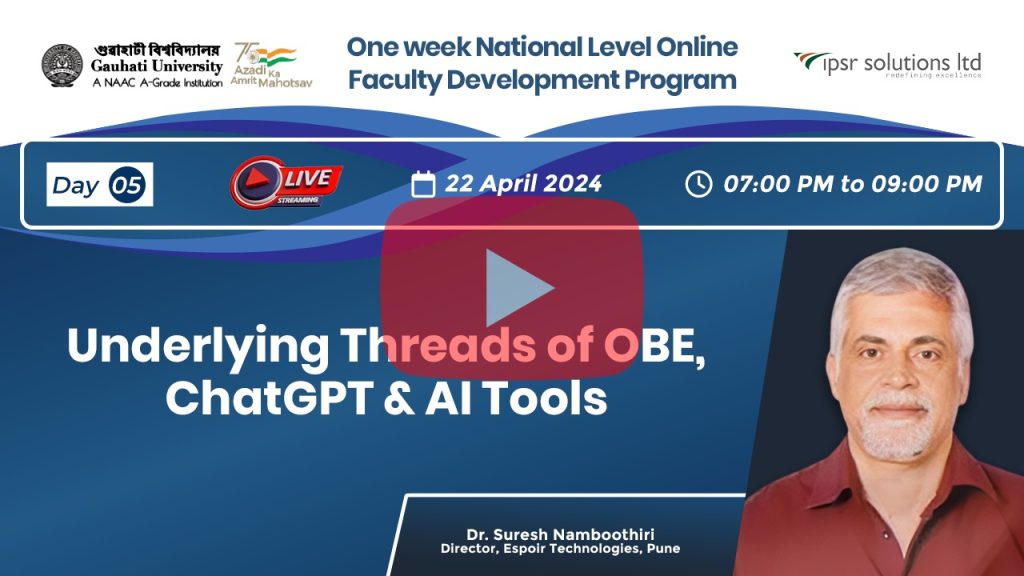
Dr Suresh Namboothiri handled the fourth day’s week-long Faculty Development Programme session based on the topic Underlying Threads of Outcome-Based Education.
Dr Namboothiri discussed the underlying threads of OBE and the usage of Artificial Intelligence for pedagogical excellence to improve the teaching-learning process. He mentioned that it is important for OBE to raise the standards of students from the bottom level to a higher level and, when a student passes out after graduation, he/she is expected to have certain attributes, otherwise known as Graduate Attributes.
Dr Namboothiri continued his session with the topic 100 plus smart ways to use ChatGPT for an exciting classroom. In his talk, Dr Namboothiri mentioned that teachers can create exciting, contextual and relevant content for the classroom. He also noted that Artificial Intelligence is a tool that learns, reasons, solves problems, and understands natural language, leveraging vast amounts of data and intricate algorithms to improve over time.
The participants were assigned multiple-choice questions based on the topic to improve their depth of knowledge in the field.
Click to watch Dr Suresh Namboothiri’s day four session Underlying Threads of Outcome-Based Education.
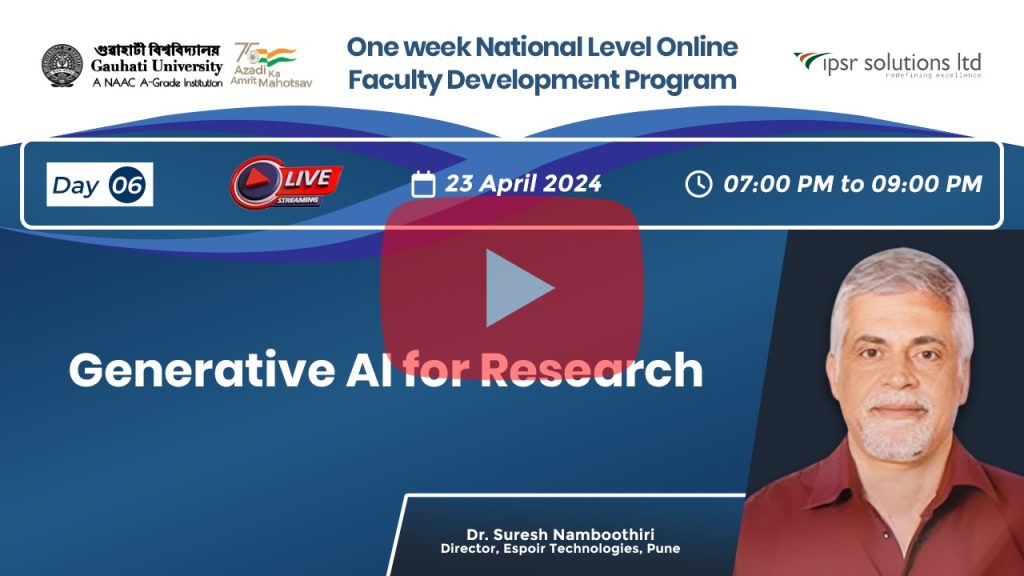
Dr Suresh Namboothiri started the sixth day’s session based on AI in Research. After a brief introduction to Artificial Intelligence, he moved into the more complex matters related to AI like, what AI can do in research, Reasons why generative AI doesn’t lead to plagiarism, and so on. After the session on AI, Dr Namboothiri introduced “Vigyana” the platform developed for improving research in India. He mentioned that this platform uses a 12-step research methodology blended with prompt engineering, critical thinking, and artificial intelligence. Dr Namboothiri further mentioned that this platform incorporates a Socratic feedback system that provides new and original publication ideas.
A task “Innovative Practices in Teaching and Learning” was assigned to the participants after the sixth day’s session.
Click to watch the sixth day’s session Generative AI for Research by Dr Suresh Namboothiri.
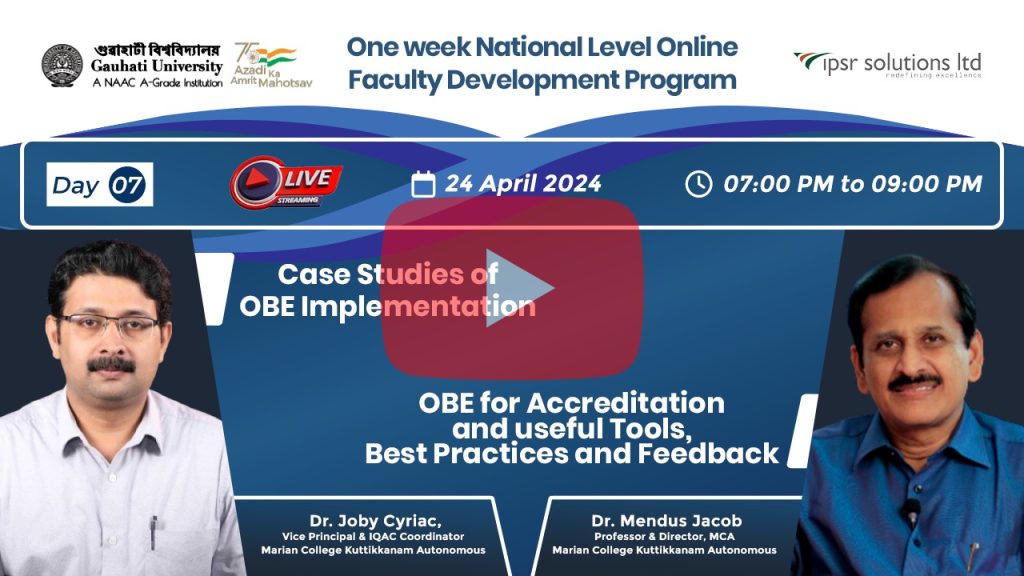
The seventh and final day consisted of two sessions, Case Studies of OBE Implementation led by Dr Joby Cyriac and, OBE for Accreditation and Useful Tools, Best Practices and Feedback led by Dr Mendus Jacob.
Dr Joby started his session with a brief overview of Gauhati University before entering into his main session about the experiences of Outcome Based Education at Marian College Autonomous Kuttikkanam. Dr Joby mentioned that Marian College with just 29 years in the education sector began the implementation of OBE in 2016, the year they attained autonomy. He mentioned that every new initiative implemented on campus yielded more learning.
Dr Joby stated that the implementation of OBE in Marian College was a real learning journey that yielded dividends and made the authorities realise that there are still miles to make things smoother. He briefed the participants about Marian College before entering into the main topic. He stated that all the stakeholders were made aware of the Program Outcomes and feedback collected from them to improve the educational standards. Dr Joby went on to discuss that the assessment process/methods needed to be changed as Marian College was concentrating on making students think on higher levels of Taxonomy.
Dr Joby further explained how outcomes are communicated effectively, the attainment of Course Outcomes, the automated exam process for OBE, the implementation process and finally the impact created due to the implementation of OBE in Marian College. He concluded the session by explaining the challenges one has to be prepared to face while implementing the OBE system in the institution.
Dr Mendus Jacob handled the second session on the final day of the seven-day Faculty Development Programme Digital Pedagogy – ICT & AI Assisted Teaching in line with OBE & NEP on the topic OBE for Accreditation and useful tools, Best Practices and finally feedback from the participants. Dr Mendus started the session by discussing the various processes by which OBE can be implemented in institutions for a better accreditation grade. He mentioned that defining the learning outcomes and designing curriculum and assessments are the first steps towards the implementation of OBE. He further went on to discuss the various benefits of OBE, the Q factors in Academics, OBE as a Best Practice, and some additional tips.
Two tasks in the form of Multiple Choice Questions were assigned by the end of the session.
Click to watch Dr Joby Cyriac and Dr Mendus Jacob’s sessions ‘Case Studies of OBE Implementation’ and ‘OBE for Accreditation and Useful Tools & Best Practices’ on day seven.
After the informative session, Dr Mendus Jacob introduced “QnSmart i” and “QuestionPaper.ai” – two powerful tools with a user-friendly interface and incorporated multiple features to streamline the process of quality question paper generation.
Salient Features:
The versatile template system allows educators to create customized templates to suit their specific requirements and the gallery of quick templates allows quick question paper generation. The copy, modify and archive facility ensures efficiency and consistency in question paper design. The system can effortlessly generate questions from any topic or discipline and at various levels of Bloom’s Taxonomy and the educators have the flexibility to edit, regenerate, and modify questions ensuring uniqueness in each paper and tailored to their teaching objectives.
Being ‘Outcome Based Education’ friendly, the software enables users to input Course Outcomes (COs) and map each question to the respective COs ensuring alignment with curriculum goals and assessment standards. The software, apart from being economical in terms of time and cost, allows users to archive question papers for future reference, reducing the repetitive task of question paper creation. The tool excels in generating accurate answers facilitating the preparation of scoring keys and valuation schemes, and is an invaluable resource for creating a diverse set of options and correct answers for multiple-choice questions, contributing to fair and efficient grading processes.
Dr Mendus Jacob introduced ”QnSmart i” and “QuestionPaper.ai” to the participants as two revolutionary tools designed to streamline the process of question paper creation in the realm of education. He mentioned that with these platforms, educators will have the power to craft their templates by drawing from a diverse gallery of quick templates, efficiently generate question papers and that these templates can be copied, modified, and archived for future use, ensuring maximum flexibility. On mentioning question generation, Dr Mendus said what truly sets these two software apart is their flexibility in generating questions from any topic, or discipline, or accommodating various levels of Bloom’s Taxonomy. He also mentioned that as the systems are aligned with Outcome Based Education, it allows input of Course Outcomes and maps questions accordingly facilitating the assessment process. Regarding the cost-effectiveness of the software,
Dr Mendus mentioned that it’s a time and cost-efficient solution as it lets to archive question papers for future reference, thereby saving valuable time. He also mentioned that “QnSmart i” and “QuestionPaper.ai” aids in generating accurate answers for the questions generated, simplifying the preparation of scoring keys and valuation schemes, making it an indispensable tool for crafting multiple-choice questions with distracting options and correct answers. In his concluding words, Dr Mendus mentioned that the implementation of these platforms will be the first step towards the implementation of OBE, enhancement of curriculum quality, and most importantly, saving valuable time of faculty members and considerable cost savings to the institution compared to the traditional method of question paper preparation.
After introducing “QnSmart i” and “QuestionPaper.ai” software, Dr Mendus took feedback from the participants regarding the Faculty Development Programme.
Prof Padmini Bhuyan Boruah, the coordinator of the Faculty Development Programme delivered the Word of Thanks. Prof Padmini mentioned that the seven-day Faculty Development Programme seemed to end at a fast pace and the responses of the participants stated that it was very successful. In her speech, she thanked the honourable Vice Chancellor for his encouragement and support and the ipsr team members and the resource persons for offering a well-structured Faculty Development Programme, especially Dr Mendus Jacob for his support in adopting OBE practices systematically. She mentioned that the sessions included valuable information on participatory, interactive and learner-centric learning. She further thanked the participants who took the time to attend the week-long programme. She concluded the speech by mentioning that this FDP has not only generated interest in OBE but also shown the method of implementing it. She took time to thank the members of Gauhati University for their valuable support in making the FDP a success.
Join us for FREE to get instant email updates!
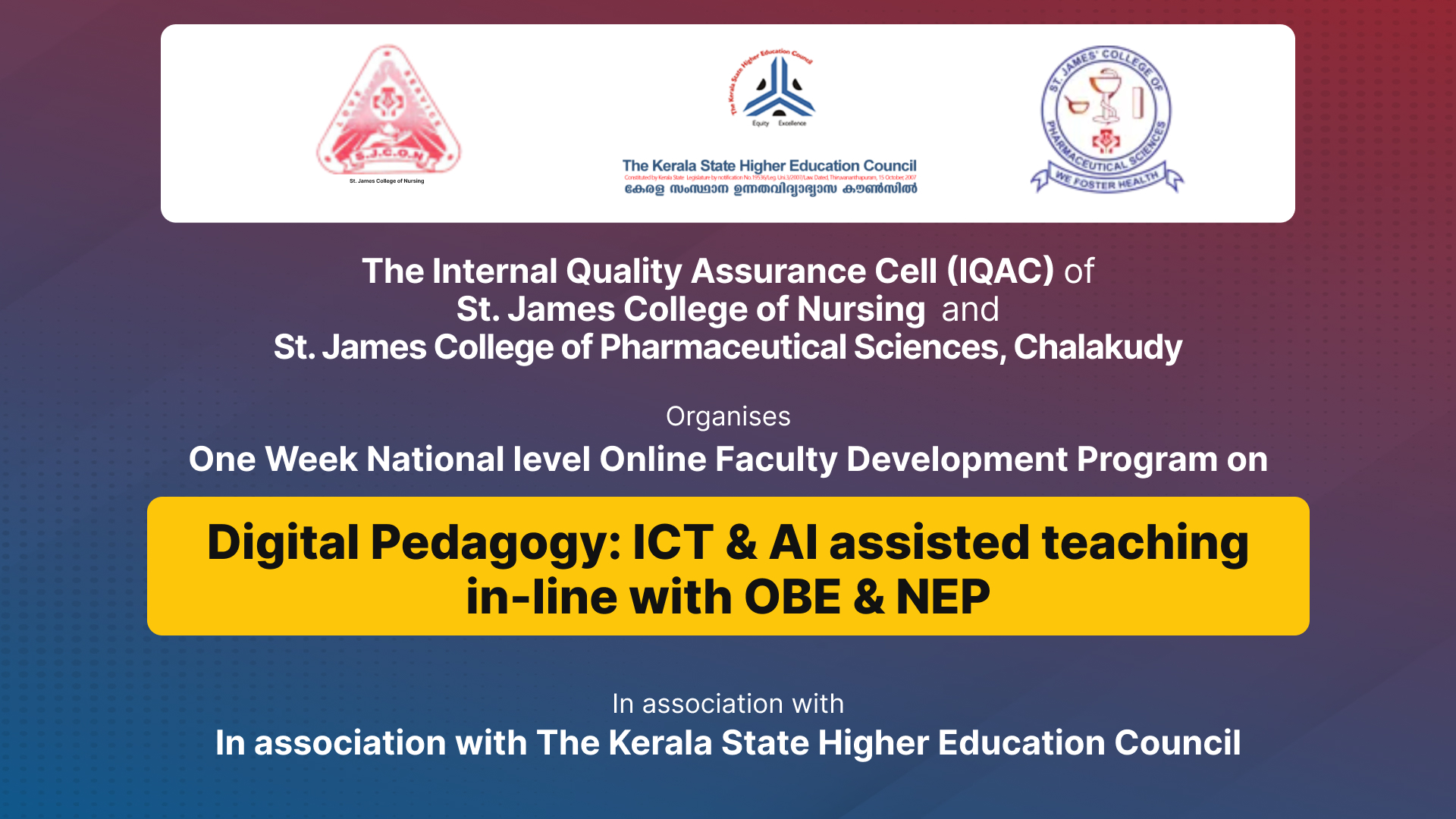
Introduction: In today’s rapidly evolving educational landscape, integrating Digital Pedagogy, […]
Leave A Comment